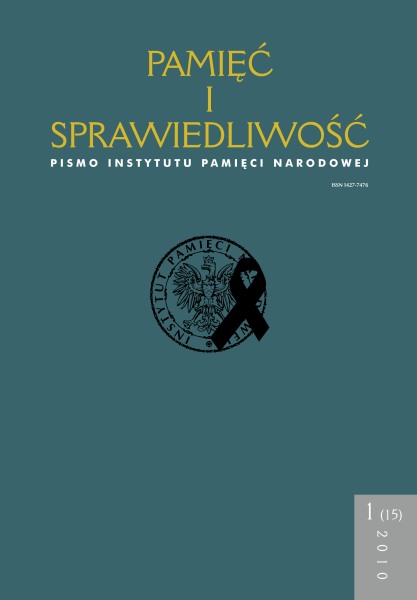Nieformalny rezonans społeczny tzw. Kongresu Zjednoczeniowego PPR i PPS w grudniu 1948 roku
Pamięć i Sprawiedliwość, Tom 15 Nr 1 (2010), strony: 263-282
Data publikacji: 2010-06-30
Abstrakt
Historiography is not able to give a clear answer to the question concerning the issue of the complete and adequate picture of the public’s opinion on the Unification Congress. The majority of preserved historical sources were subjective and created under the influence of ideology and therefore often not consistent with the actual situation. As a result of it, private journals and letters shall constitute the most accurate source of knowledge of the above-said issue. All we can do is try and indicate certain tendencies of behaviour or else some partial attitudes and opinions.
In fact, we can differentiate three groups of opinions: Persons who are satisfied with the consolidation of the Polish Workers’ Party (PPR) and the Polish Socialist Party (PPS), the majority of persons discontented with this and inconsiderable number of persons not interested in this subject matter.
People’s interest in the congress resulted not in accepting the activities undertaken by the authorities and supporting the political system, but actually in fear of the family as well as personal future. There was a common depression. People were frequently afraid of making any opinions therefore they chose to talk only when
accompanied by the closed family and reliable persons. Any resistance took rather a symbolic form. People complained about the splendour of decorations within cities, as well as, about the lack of emblems and national colours. It was widely believed, that the congress was the final proof of the communisation of Poland
and its subordination towards the Soviet Union. Any incidents of putting anticommunist inscriptions on walls or tearing off communist posters were very rare. Within rural environment people were afraid of collectivisation and the Catholics expected that the churches would be closed. The majority of people expected deterioration of working and living conditions. Some anticipations concerning the future were rather fantastical and based only on unverified rumours. The possible ways for people to escape the present situation included irony, faith, as well as,
wishful thinking.
Inne teksty tego samego autora
- Zdzisław Zblewski, Mariusz Mazur, Filip Musiał, Andrzej Nowak, Krzysztof Zamorski, [Dyskusja] Wybrane problemy metodologii i metodyki badań nad najnowszą historią Polski , Pamięć i Sprawiedliwość: Tom 20 Nr 2 (2012)
- Mariusz Mazur, Rozmowy o wartościach. Dyskusje młodzieży na łamach „Sztandaru Młodych” 1950–1956 , Pamięć i Sprawiedliwość: Tom 17 Nr 1 (2011)
- Mirosław Piotrowski, Mariusz Mazur, [Recenzja] NSZ na to nie zasłużyły. Na marginesie pracy Mirosława Piotrowskiego pt. Narodowe Siły Zbrojne na Lubelszczyźnie 1944–1947, Towarzystwo Naukowe Katolickiego Uniwersytetu Lubelskiego Jana Pawła II, Lublin 2009 , Pamięć i Sprawiedliwość: Tom 17 Nr 1 (2011)
 Język Polski
Język Polski
 English
English
 Deutsch
Deutsch
 Français (France)
Français (France)
 Italiano
Italiano
 Русский
Русский


 PDF
PDF
